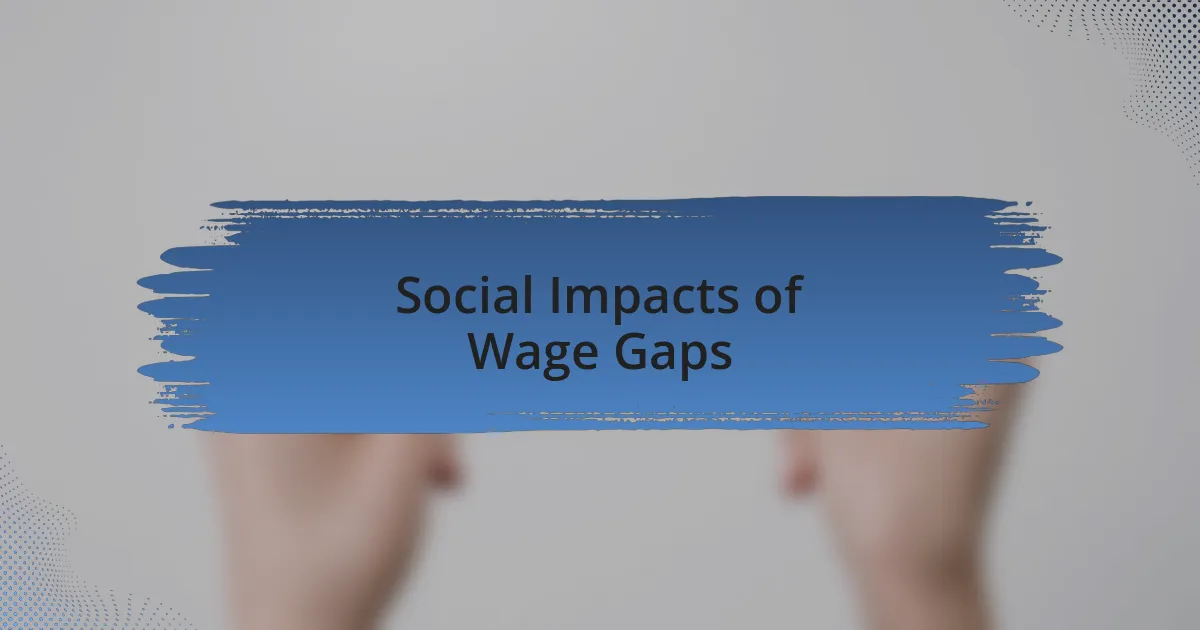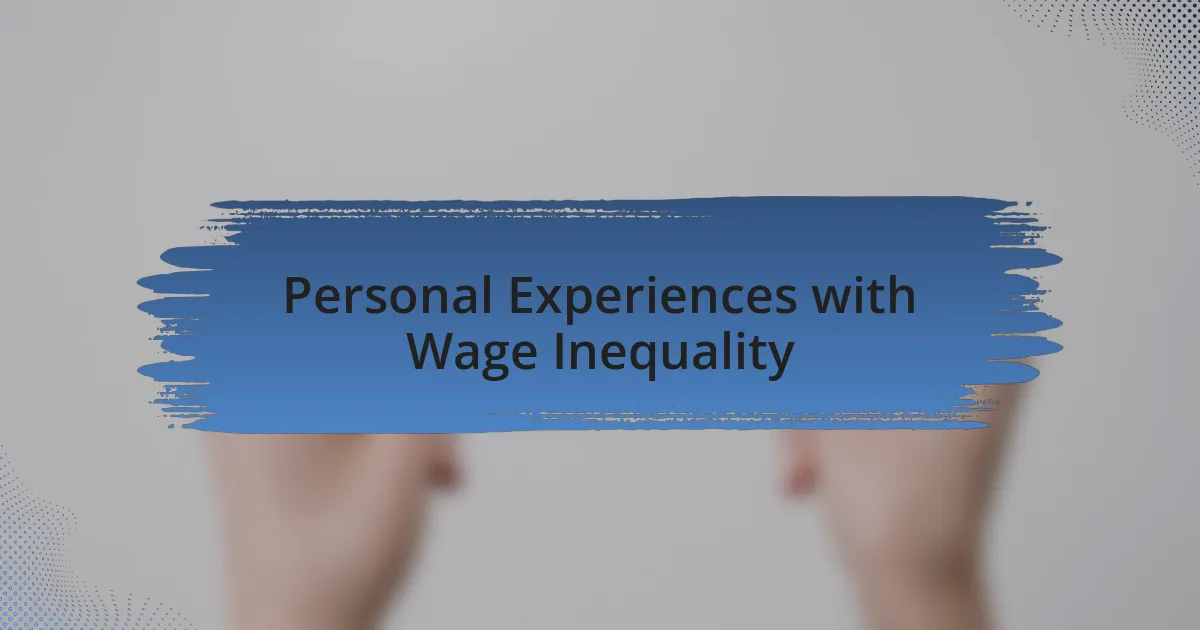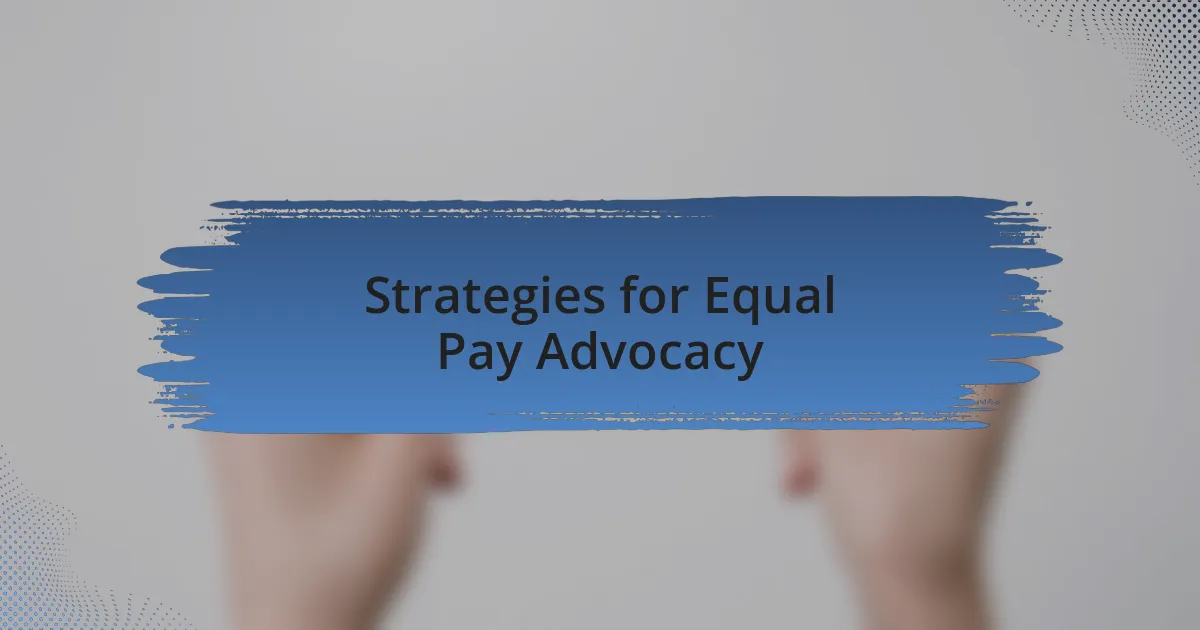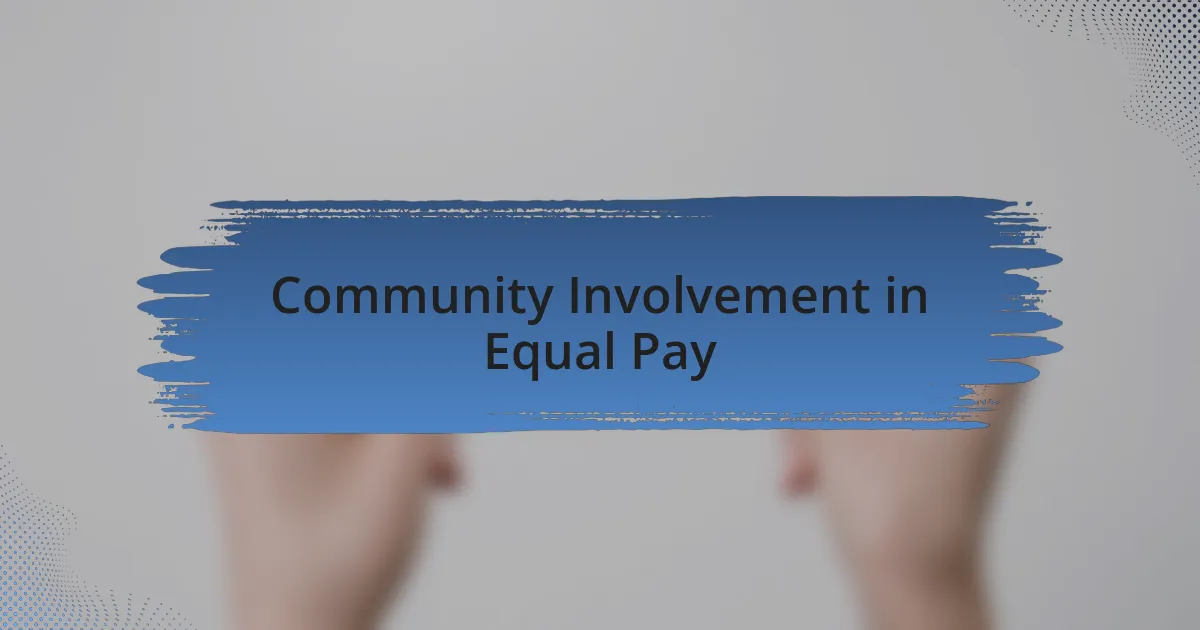Key takeaways:
- Equal pay advocacy is vital for fairness, economic stability, and the emotional well-being of individuals and communities.
- Wage gaps negatively impact not just careers but also societal progress, creativity, and opportunities for future generations.
- Personal experiences with wage inequality can inspire collective action and discussions that lead to significant changes in workplace practices.
- Community involvement and support networks are crucial for sustaining advocacy efforts and fostering a culture of accountability regarding equal pay.

Understanding Equal Pay Advocacy
Equal pay advocacy is about more than just numbers; it’s about fairness and justice in the workplace. I remember a time early in my career when I discovered my male colleague was earning significantly more than I was for doing the same job. This was a wake-up call, prompting me to dive deeper into the complexities of pay inequality.
I often see people asking, “Why should I care about equal pay?” Beyond the fact that it’s a basic human right, consider the ripple effect on families and communities. When women earn what they deserve, they can invest in their children’s education and health, creating a brighter future for everyone.
Understanding equal pay advocacy means recognizing that pay disparity doesn’t exist in a vacuum. It ties to broader social issues like gender discrimination and socioeconomic status. I have felt the emotional weight of this issue firsthand, and it fuels my passion for advocating for change, inspiring others to join the movement for equitable workplaces.

Importance of Equal Pay
Equal pay is crucial not just for individual careers but also for fostering a sense of dignity and respect in the workplace. I recall a discussion I had with a close friend who, despite her impressive qualifications, felt undervalued due to being paid less than her peers. My heart ached for her because it was clear that the disparity affected her confidence and job satisfaction.
The significance of equal pay extends to economic stability, as households thrive when both partners earn fairly. I often wonder how many people realize that closing the pay gap could lift millions out of poverty. This isn’t just about fairness; it translates to more spending power within communities, which benefits us all.
Furthermore, equal pay can serve as a potent motivator in the workplace. When employees know they are compensated fairly, they tend to be more engaged and committed. I’ve witnessed teams flourish under a culture of equality, where collaboration and productivity soar—and truly, who wouldn’t want to be part of that environment?

Social Impacts of Wage Gaps
The social impacts of wage gaps ripple far beyond individual experiences, shaping community dynamics in profound ways. For instance, I remember a neighborhood event where families gathered to discuss the rising cost of living. It struck me when several parents shared how wage disparities made it challenging to support their children’s education, reflecting a collective struggle that constrained opportunities for the next generation. This isn’t just an economic issue; it’s a societal one that hinders progress.
Moreover, the psychological toll of wage gaps can be staggering. I once spoke to a talented artist who stopped creating because she couldn’t afford to pursue her passion due to financial stress stemming from unequal pay. Can you imagine how many creative voices might be silenced because of similar pressures? It’s heartbreaking to think that income inequality not only impacts livelihoods but also stifles innovation and cultural expression in our communities.
There’s also the danger of normalizing inequality, where wage disparities become accepted as a standard. I find it alarming how easily such injustices can morph into intergenerational cycles, reinforcing beliefs that certain groups simply aren’t worth equal pay. This acceptance can create a culture of silence that stifles advocacy and change. So, how can we challenge this status quo? I believe it begins with every conversation we initiate about pay, turning the spotlight on these disparities and demanding that they be addressed.

Personal Experiences with Wage Inequality
Wage inequality has touched my life more than I care to admit. Early in my career, I discovered that a male colleague with similar experience and qualifications was earning significantly more. It felt like a slap in the face. I remember the knot in my stomach as I weighed the bravery it would take to raise this concern with my supervisor. Will my honesty lead to retribution or recognition? That thought churned in my mind for weeks.
I also remember a conversation with a close friend about our experiences in the workplace. She shared how she was often overlooked for promotions, despite her dedication and results. The frustration in her voice resonated with me; it highlighted just how intrinsic wage inequality is to our professional reality. It’s astonishing how easily one can feel diminished, as if their worth is tied to an unjust system rather than their true capabilities.
Reflecting on these experiences, I often wonder how pervasive this issue is across different industries. Are we all walking around carrying the weight of these disparities, silently? When I think about it, I realize that sharing our stories is crucial. It can spark the motivation we need to demand change and foster a more equal playing field for everyone.

Strategies for Equal Pay Advocacy
Advocating for equal pay requires a multifaceted approach. One effective strategy I’ve seen is organizing workshops and discussions where employees can openly share their wage experiences. I recall attending a session where people unveiled their salaries anonymously, which led to some eye-opening revelations about disparities. It was astounding to witness how this collective understanding prompted individuals to feel empowered to address their own situations.
Another tactic involves leveraging data to create a compelling case for equal pay. During my research, I found that presenting clear statistics and case studies can resonate with management. I can personally attest to the effectiveness of this strategy when I was part of a team presenting findings on pay gaps within our organization. The hard data spoke volumes and helped shift the conversation from abstract notions to concrete action.
Building alliances with supportive peers and mentors is equally vital. I remember how my mentor not only helped me navigate conversations about salary but also encouraged me to advocate for others. This sense of community can create a powerful network that not only voices the need for change but also fosters accountability within the workplace. Are we leaning into our support systems enough? Going forward, I believe we must harness these connections to champion equal pay collectively.

Community Involvement in Equal Pay
It’s really inspiring to see communities rallying around the issue of equal pay. I once participated in a community forum where local leaders, activists, and residents came together to discuss the wage gap in our town. The dialogue was electrifying, as each person shared their story, revealing how broad and deep the issue ran through various sectors. It made me realize that change is often born from these shared experiences. Have you ever thought about how powerful our voices can be when united?
Engaging local businesses in these discussions can amplify our efforts tremendously. In my own experience, inviting business owners to the table transformed their understanding of equal pay challenges. I remember a small business owner acknowledging he had never considered that his pay structure might unintentionally be perpetuating inequality. Seeing their lightbulb moment was a reminder of how crucial community involvement is in pushing for equitable practices.
Moreover, it’s essential that we create ongoing support groups to maintain momentum. During one gathering, a participant mentioned how they felt isolated in their struggle for fair pay; I had felt that isolation too. Our conversation then turned into a commitment to meet regularly, sharing updates and strategies on advocating for ourselves and others. This kind of community support not only strengthens our resolve but also reinforces the idea that we are all in this together. Have you thought about finding or forming such a group in your own community? The connections we build can be immensely transformative.